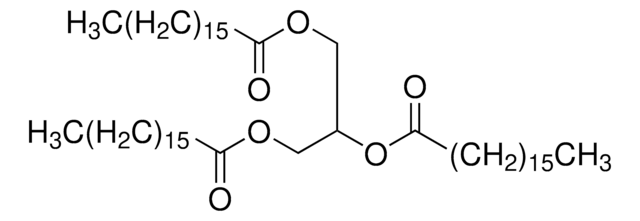T4257
Tripentadecanoin
≥99%
Synonym(s):
TG(15:0/15:0/15:0), 1,2,3-Tripentadecanoylglycerol
About This Item
Recommended Products
biological source
synthetic (organic)
Assay
≥99%
form
powder
functional group
ester
lipid type
neutral glycerides
shipped in
ambient
storage temp.
−20°C
SMILES string
CCCCCCCCCCCCCCC(=O)OCC(COC(=O)CCCCCCCCCCCCCC)OC(=O)CCCCCCCCCCCCCC
InChI
1S/C48H92O6/c1-4-7-10-13-16-19-22-25-28-31-34-37-40-46(49)52-43-45(54-48(51)42-39-36-33-30-27-24-21-18-15-12-9-6-3)44-53-47(50)41-38-35-32-29-26-23-20-17-14-11-8-5-2/h45H,4-44H2,1-3H3
InChI key
CLJLWABDLPQTHL-UHFFFAOYSA-N
Application
- A rare natural lipid induces neuroglobin expression to prevent amyloid oligomers toxicity and retinal neurodegeneration.: This study explores the protective effects of a rare natural lipid, presumably including Tripentadecanoin, on neurodegeneration. It specifically focuses on neuroglobin expression to combat amyloid oligomers′ toxicity in the retina (Oamen et al., 2022).
- Analysis of fatty acid content and composition in microalgae.: This research details methods for analyzing fatty acid content and composition in microalgae, providing insights into how Tripentadecanoin and similar fatty acids are profiled in these organisms (Breuer et al., 2013).
Storage Class Code
11 - Combustible Solids
WGK
WGK 3
Flash Point(F)
Not applicable
Flash Point(C)
Not applicable
Personal Protective Equipment
Certificates of Analysis (COA)
Search for Certificates of Analysis (COA) by entering the products Lot/Batch Number. Lot and Batch Numbers can be found on a product’s label following the words ‘Lot’ or ‘Batch’.
Already Own This Product?
Find documentation for the products that you have recently purchased in the Document Library.
Customers Also Viewed
Our team of scientists has experience in all areas of research including Life Science, Material Science, Chemical Synthesis, Chromatography, Analytical and many others.
Contact Technical Service













